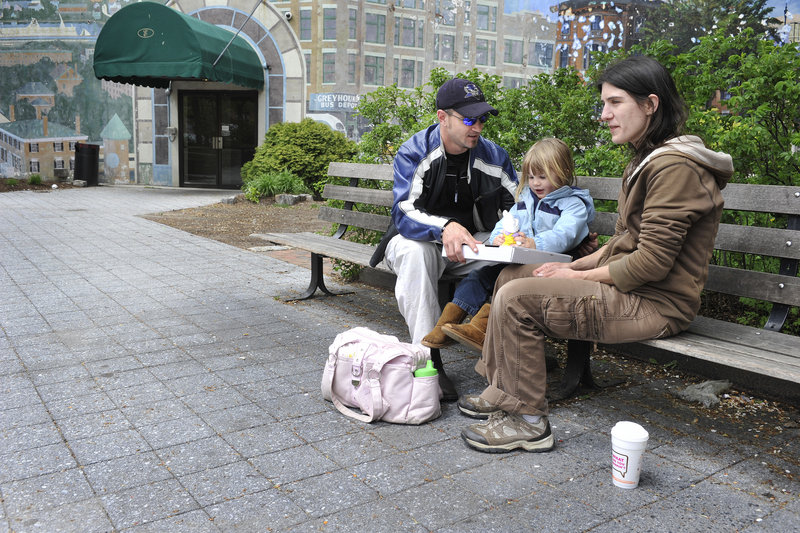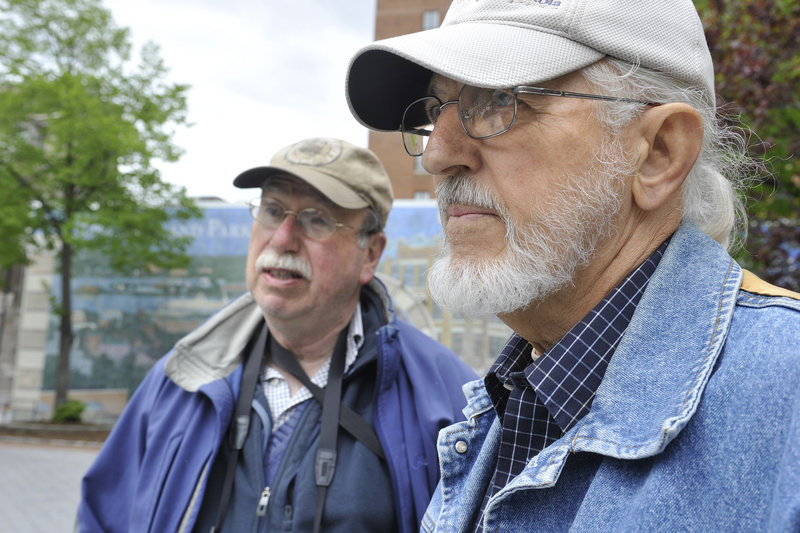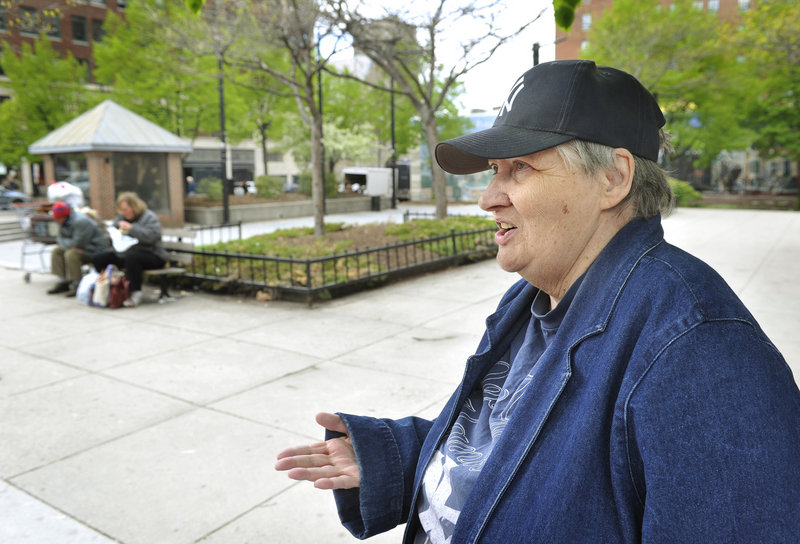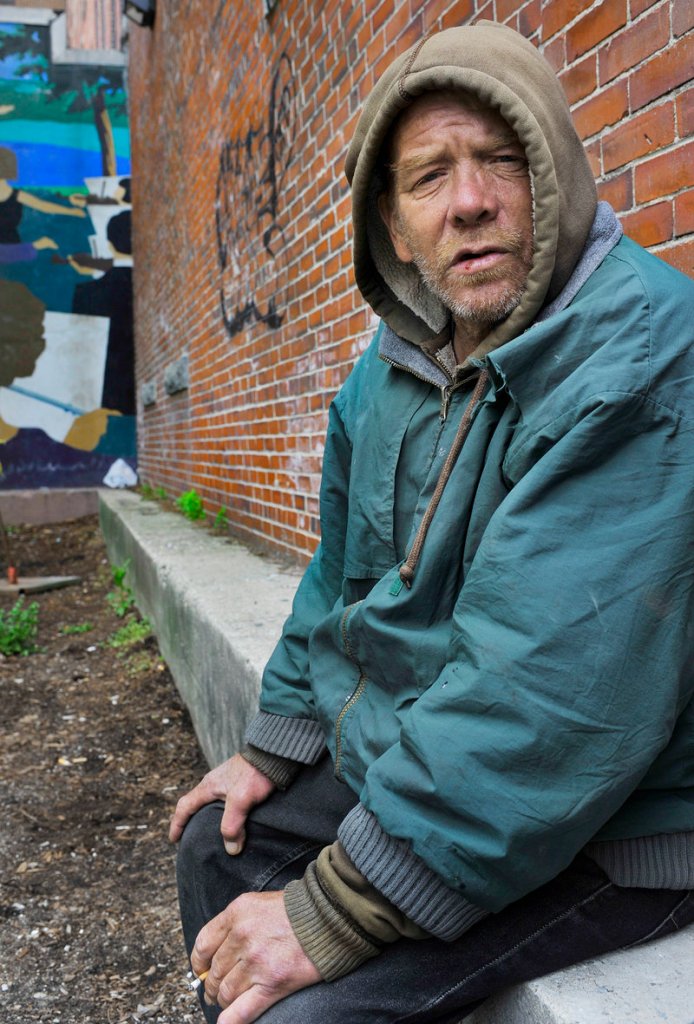It’s noon on a sunny day in May. But in downtown Portland, Congress Square Plaza is almost devoid of life.
Six people are in the plaza. On a bench, a family is eating pizza. The others are homeless. Two men sitting near a back wall appear to be drunk.
Janice Cole, 70, who lives in a nearby apartment, says she doesn’t like to come to the plaza because it doesn’t feel safe. “It’s really quite sad,” she says, standing at the park’s edge.
She came on this day to look at the mural on the rear entrance of the Eastland Park Hotel, but she seems hesitant to leave the security of the sidewalk to step any closer.
Congress Square Plaza, widely considered to be a failure in urban design, is now at the center of a debate over the value of public space versus economic development.
The Eastland Park Hotel is proposing to buy the plaza from the city so it can build a ballroom, the centerpiece of a multimillion-dollar renovation and expansion of the once-grand hotel.
The hotel’s plan would save only a small strip of the park — about as wide as a driveway — along Congress Street.
Supporters of the project say it would be a huge boost for the city’s attempt to bring economic development to the arts district, which has lagged far behind Portland’s more prosperous Old Port. But many residents in the area want the city to redesign the park rather than sell off valuable public space.
To make their decision, policy makers will have to wrestle with this question: Can the park be saved?
“It’s a conundrum,” says Anthony Muench, a landscape architect who comes to Congress Square Plaza at the invitation of a reporter to observe the activity there with his friend Charles Alden, a retired urban planner.
The two experts are fascinated by the epic failure of the park, which the city established in 1981 as part of a program funded by a federal grant. The Dunkin’ Donuts shop that previously occupied the site was torn down. The shop had been a magnet for prostitutes.
Muench and Alden blame the park’s dysfunction on bad design and its challenging location.
At the root of the problem is the terrain, they say. The land slopes down toward the Eastland Park Hotel. To make the park’s surface meet the hotel’s rear entrance at level grade, the designers sank the park about 3 feet below the level of the sidewalk at Congress Street.
The privacy afforded by the sunken park allows for behavior, like public drinking, that wouldn’t occur if people were more visible, Muench and Alden say.
The old Union Station clock and a raised planting bed along High Street also shield the park from the public.
Another problem is that two sides of the park back up to the facades of two buildings. “There is nothing happening — nothing animating from the facades of those buildings, nothing generating pedestrian activity,” Alden says.
Seclusion, in fact, is what attracts the homeless. They can hang out in the plaza and not be bothered by anyone. And the park’s southern exposure provides sunlight all day during winter, while the buildings to the west and north block cold winds.
“It’s comfortable. They should keep it exactly the way it is,” says Joseph Morris, 53, who spends his night at a shelter and comes to Congress Square Plaza every day.
Lawrence Allen of Standish, his wife and their 3-year-old daughter arrive at the plaza with a box of pizza. Allen initially wants to avoid the park because he doesn’t want his daughter to see the public drinking, but it’s so empty it seems safe enough, he says.
As he eats lunch, Allen says the city should sell the park to the hotel.
“I’m all for taking this over,” he says. “No one uses it, other than it being a homeless hangout. It doesn’t portray a good image for the city.”
His wife, Cara Leavitt, disagrees. “It’s nice to see the open space this close to where it’s so busy,” she says.
As critical of the park as they are, Muench and Alden agree with Leavitt. For all its flaws, Congress Square Plaza can be saved with good design, they say.
Most important, the sunken floor must be raised to the level of Congress Street. Muench notes that Boston’s Copley Plaza once had a sunken park, which got used for drug dealing. The city raised the park and got rid of the crime.
Also, they say, the facades at the two rear corners must brought to life, perhaps with a cafe.
A well-designed park can be a catalyst for economic development, Alden says. Because public space is so difficult to acquire, Portland should do everything it can to preserve it, he says.
“This is such a valuable place,” he says. “It would be unfortunate to squander a resource that is part of the community.”
Staff Writer Tom Bell can be contacted at 791-6369 or at:
tbell@pressherald.com
Twitter: TomBellPortland
Send questions/comments to the editors.





